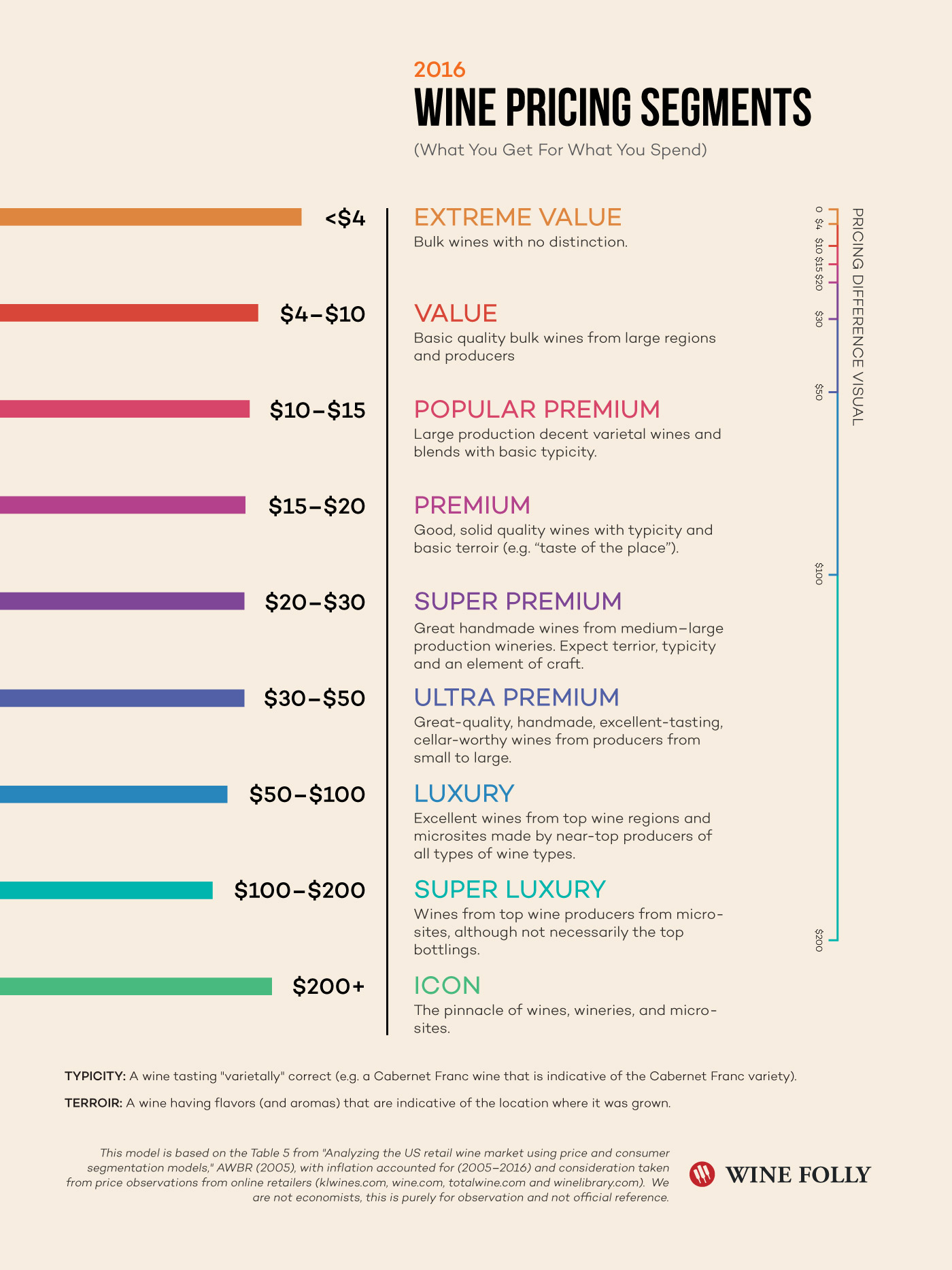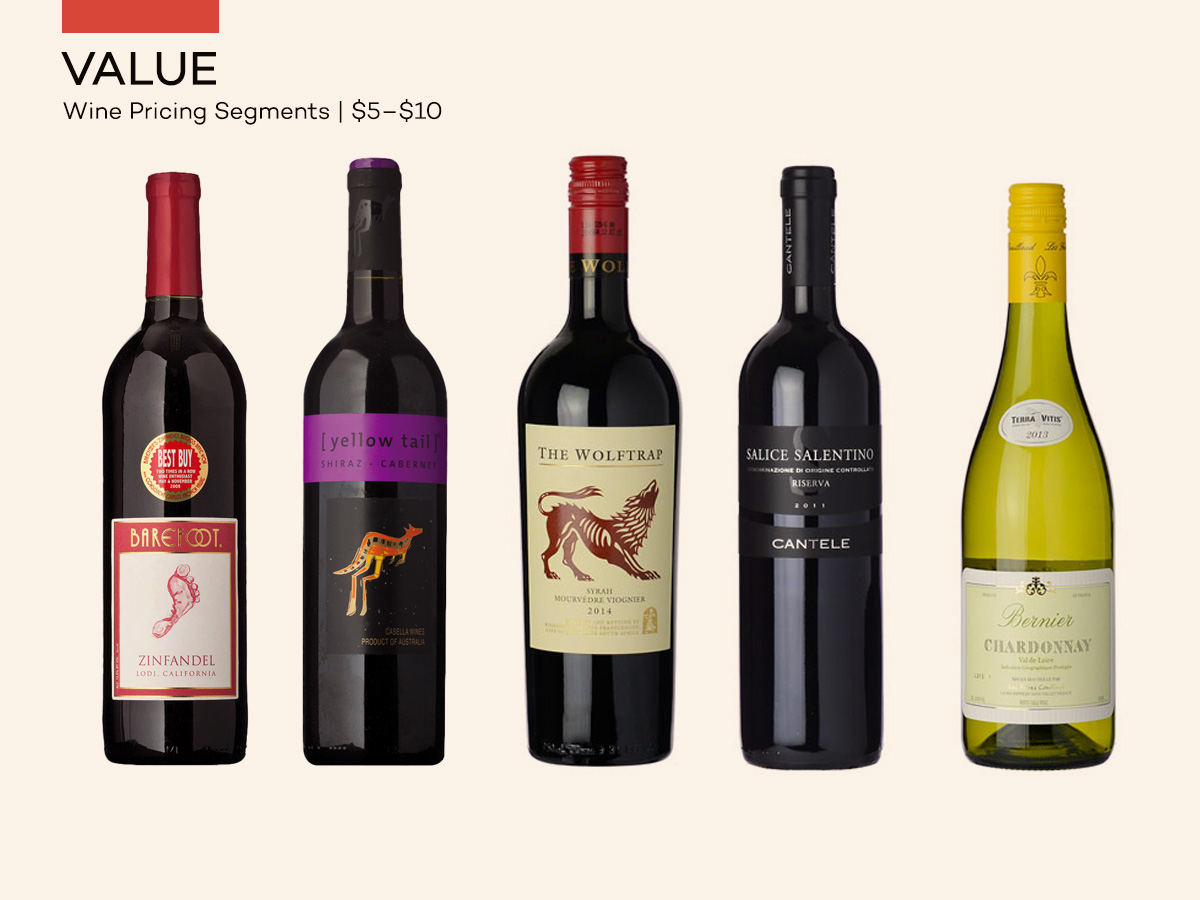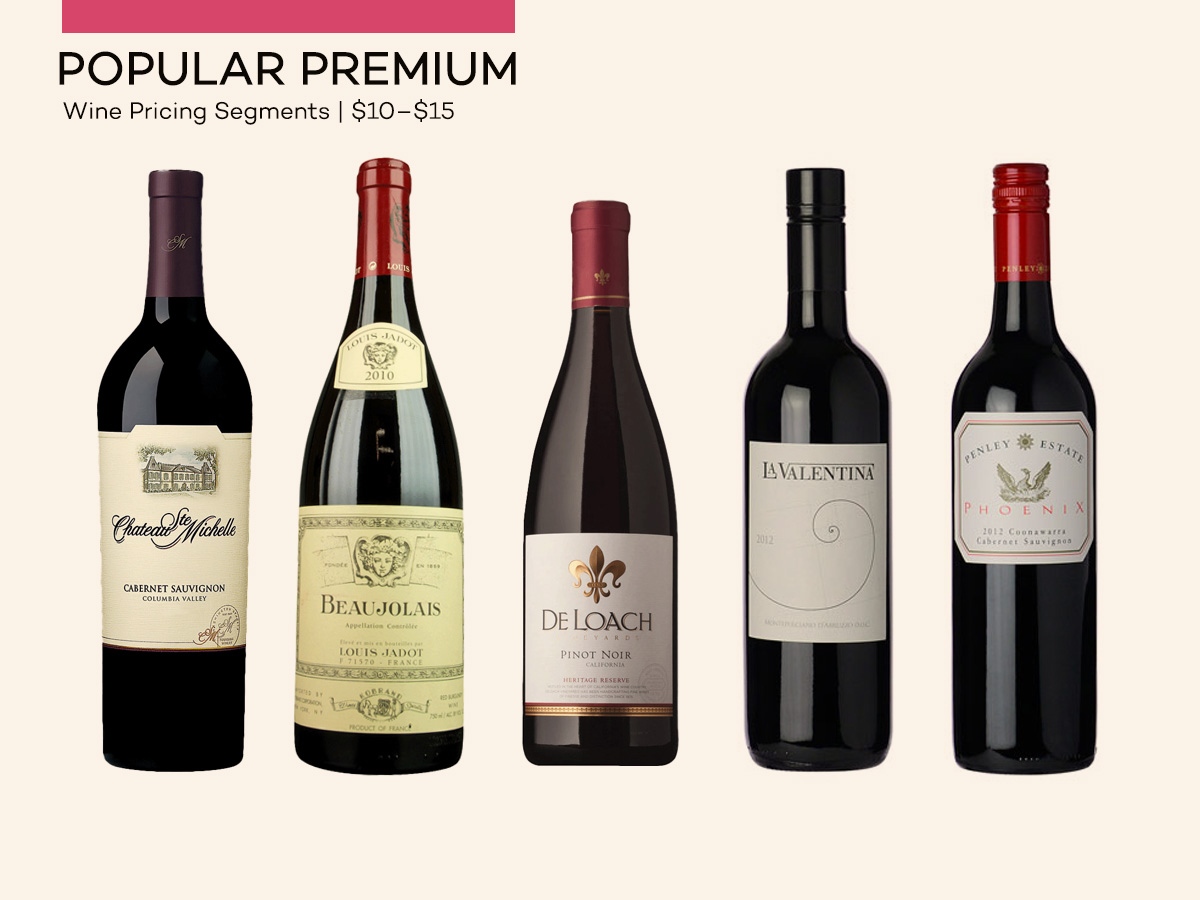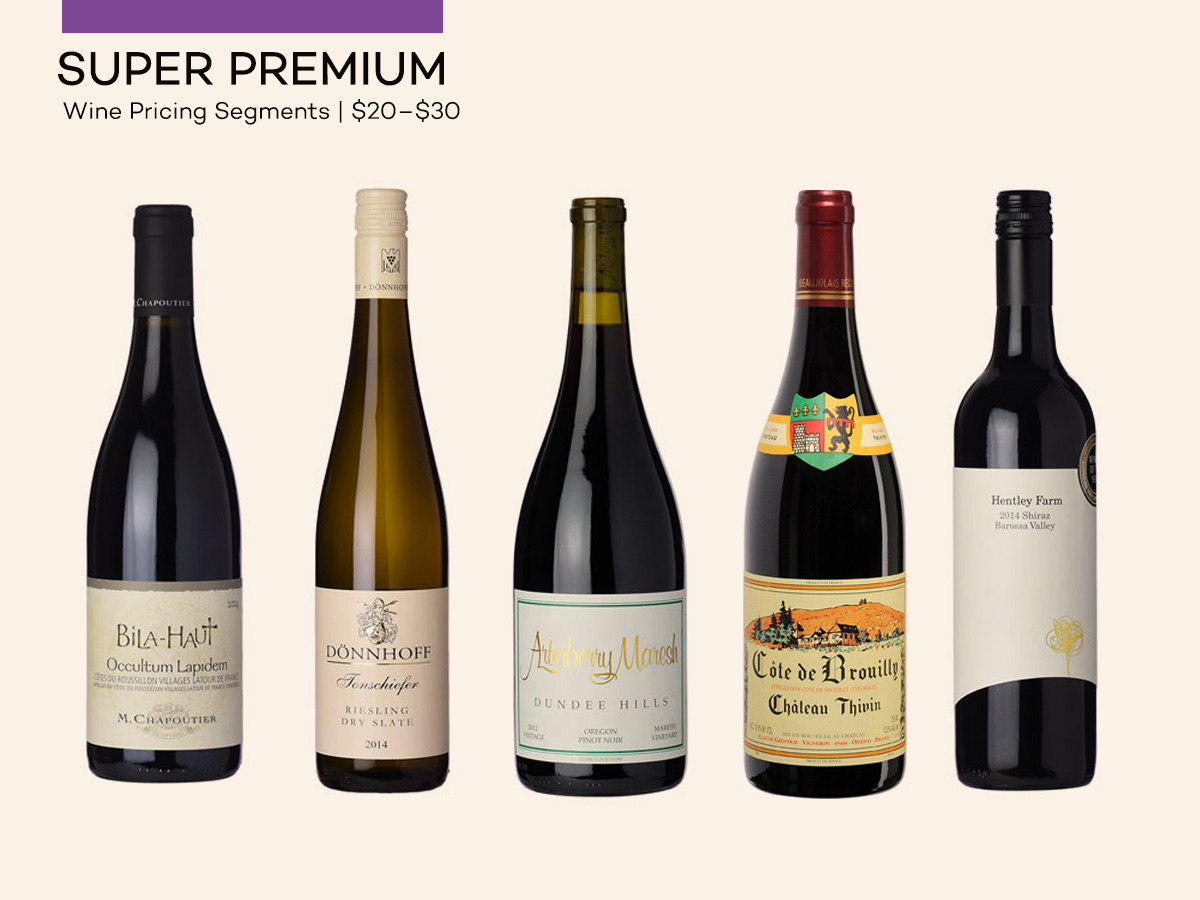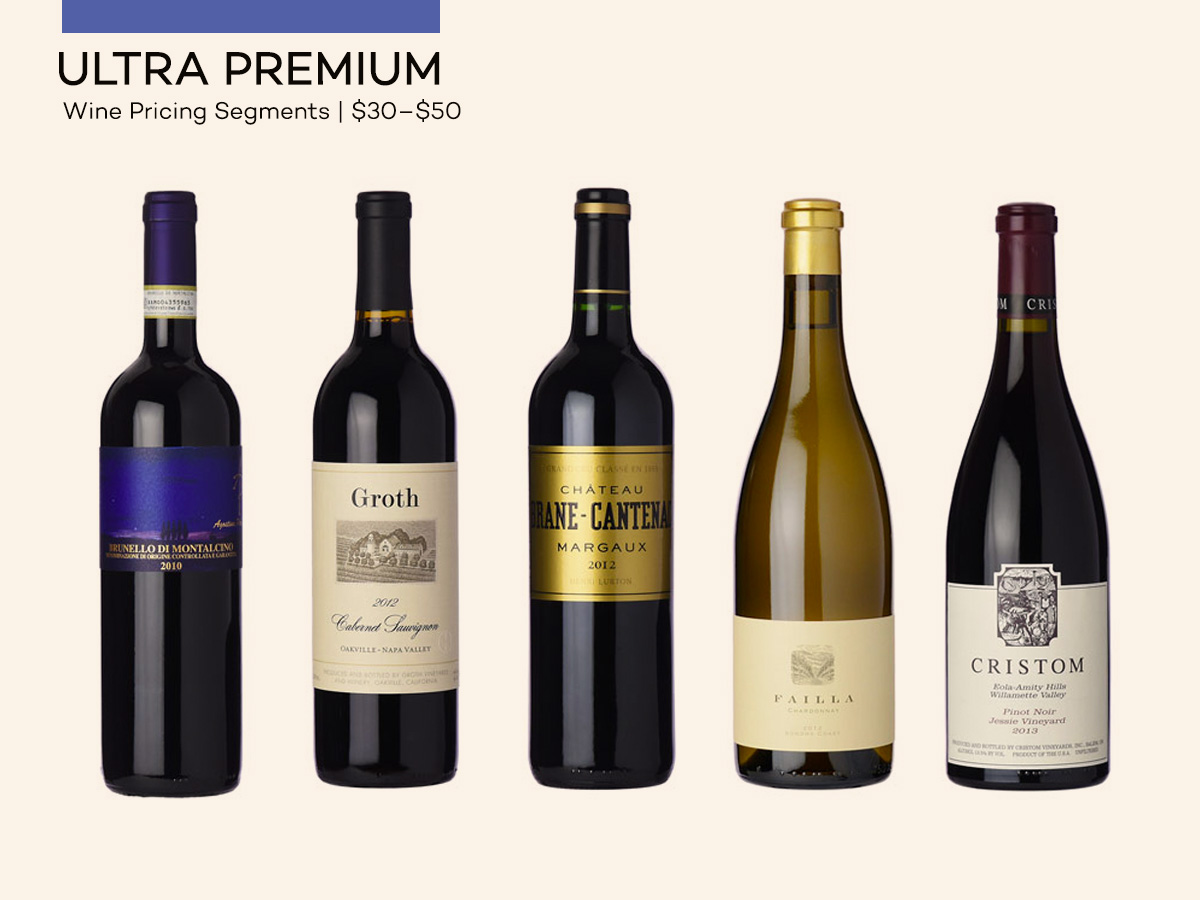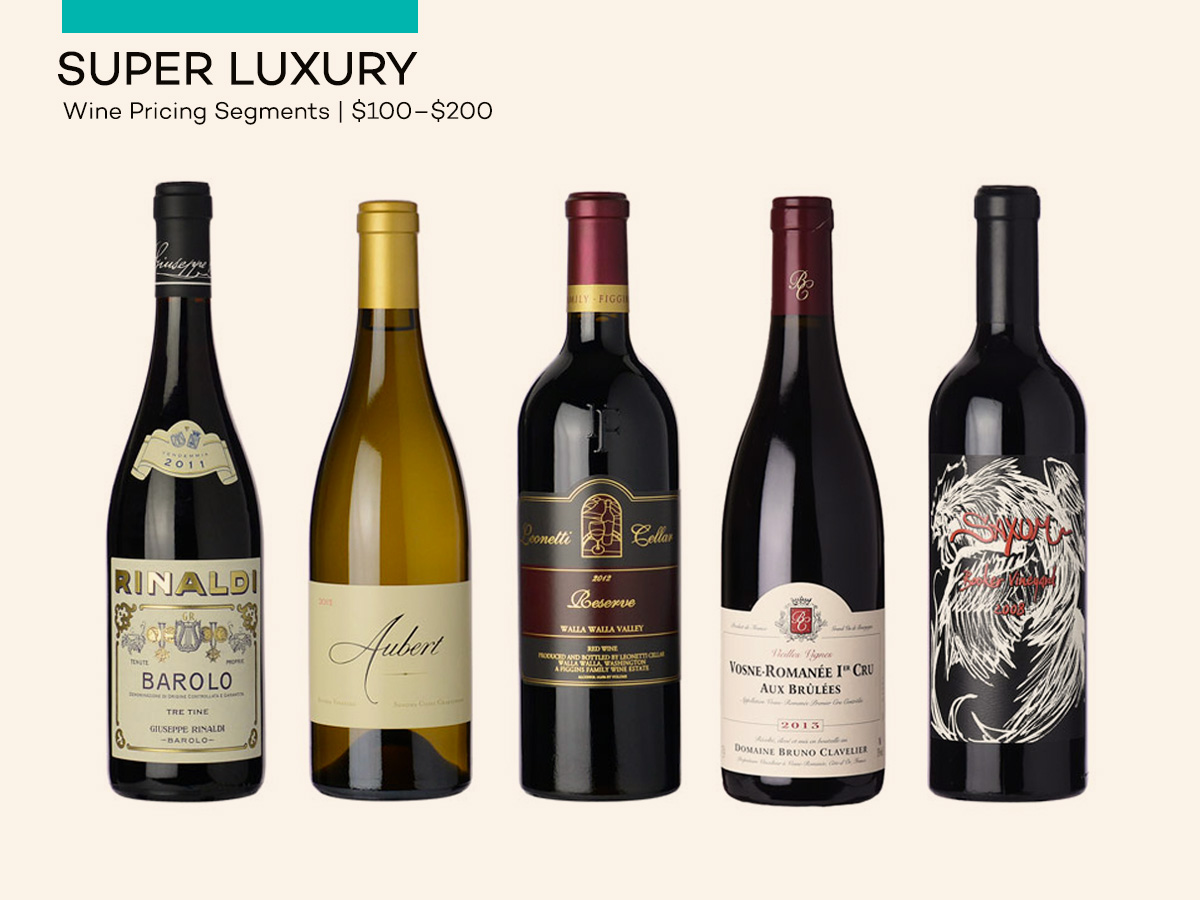Wine prices are a lot more pre-thought-out than you might realize. There are different pricing segments for wine, which include words like “ultra-premium,” “popular premium,” and “super value.” Let’s take a look at these categories of wine prices (and how they’ve increased) and understand what to expect based on what you spend.
How much should we expect to spend on decent wine? After researching wine pricing segmentation and observing pricing from major retailers online, we’ve come to the tentative conclusion that wines with typicity are much closer to $15 a bottle (in the United States). Also, if you want to buy a bottle of something hand-crafted, it’s hard to spend less than $20 for wine from a small-production winery.
Prices are going up
You can thank inflation for the cost of premium wine going up into the 15-dollar bracket. Fortunately, because the United States still has a strong dollar, there are some good values from economically stressed wine areas (Greece, Chile, and Argentina) and off-beat varietals (anyone up for a bottle of red wine, perhaps Mavrud or Agiorgitiko?)
The Reality of Wine Prices
- In 2015, the United States was the world’s leading consumer of wine with both a large domestic and import market
- The United States continues to grow wine consumption each year
- Many Wine Folly readers live in the United States
Extreme Value Wine
Cost: under $4
The lowest quality tier “Extreme Value Wine” includes some familiar labels such as Gallo Family Vineyards, Sutter Home, Crane Lake (Bronco Wine Co), Tisdale (a Gallo brand), Rex Goliath (Constellation Wine brand) and several bag-in-a-box brands (with a cost per bottle below four dollars).
To produce wines for the extreme value category, a winery must have a large commercial production and integrated distribution to make it economically viable. Typically, these wines come from large, efficient commercial vineyards (in California: probably Madera, Lodi, and parts of Monterey.)
The wines are often a blend of several vintages (or NV “non-vintage”), several grapes, and several regions (e.g., “California” or “USA” on the label). This is mashup wine, drink-to-be-drunk wine.
Value Wine
Cost: $4–$10
The first step up from the baseline is value wines. On the lower side of the value spectrum are the wines that usually have a dollop of residual sugar to make them more palatable (Black Box Merlot, Barefoot, Lindemans, Yellow Tail, etc.) On the higher side of the value spectrum (the $9–$10 mark) is where you’ll find the beginnings of quality. The higher tier value wines are mostly from large US, French, and Italian wineries that focus on good baseline quality wine for everyday drinking. There are also a few wines from economically depressed wine regions or made from esoteric varieties such as Greek Agiorgtiko or Portuguese Vinho Verde. Many value wines are varietal wines from single vintages with grapes sourced from larger regions.
Popular “Premium” Wine
Cost: $10–$15
This is the sweet spot for most US wine buyers. Premium isn’t a fair name for this category, and we like to think of it more like the “Baseline Typicity” wine. Also, the premium category is a bit of a misnomer because, on the one hand, you can find quite a few decent varietal wines from good large-production wineries.
On the other hand, there are also a fair number of inflated “white label” branded bulk wines with eye-catching labels that cause buyer confusion. In our opinion, the good wines within this category show the beginnings of typicity in wine (e.g., “a Cabernet Sauvignon that tastes like Cabernet Sauvignon,” etc.).
They are labeled with a slightly more focused region (e.g., North Coast vs. California). Unoaked white wines are generally higher quality at this price point than red wines because oak barrels cost money, and red wine grapes typically cost more per ton (save for Chardonnay).
What is typicity?
Typicity is when a bottle of wine tastes “varietally” correct (e.g. a Cabernet Franc wine that tastes of the Cabernet Franc variety).
Premium Wine
Cost: $15–$20
Premiums are good, solid quality wines with both typicity and the beginnings of terroir. The premium wine category seems to be the true start of high-quality winemaking.
There will be some exceptional finds with high ratings in this category (particularly on good vintages), and you’ll find more wines from focused regions (e.g., Sta Rita Hills vs. Central Coast). In red wine, they will be oak-aged and from mid- to large-sized wineries that can hand harvest their grapes (especially from economically depressed countries).
What is terroir?
Terroir is when a wine has flavors (and aromas) that indicate the location where it was grown.
Super-Premium Wine
Cost: $20–$30
The super-premium wine category is the entry-level for great handmade wines from medium to large production wineries. Also, this price point affords good quality for in-demand wine varieties (e.g., Pinot Noir). Expect terroir, typicity, and an element of craft in this category.
Ultra Premium Wine
Cost: $30–$50
Ultra Premiums are great-quality, excellent-tasting, cellar-worthy wines from producers of all sizes. Beyond this price point is where wine prices become a diminishing return to buy wines from in-demand wine regions (e.g., Napa Valley, Bordeaux, Barbaresco) or in-demand wineries.
Luxury Wine
Cost: $50–$100
This will get you excellent wines from any of the world’s top wine regions from near-top producers, including special vineyard-designates, unique aging requirements, and in-demand wine varieties.
This cost will get you into prestige as associated with a region (e.g., Red Mountain, Oakville, Templeton Gap, Bolgheri, Champagne, etc.)
Super Luxury Wine
Cost: $100–$200
This category will get you into wines from top producers from the world’s prestigious wine regions, although not necessarily their top bottling.
Icon Wine
Cost:$200+
The pinnacle of wines, wineries, and micro sites of the world.
Last Word: Wine Prices
Hopefully, understanding the current state of wine prices will help make sense of quality in wine and allow you to evaluate the wines based on their quality-to-price-ratio (QPR). Happy hunting!

How we came about pricing information
The model above is novel and based on Table 5 from “Analyzing the US retail wine market using price and consumer segmentation models” AWBR (2005), with inflation, accounted for (11 years from 2005–2016) and consideration taken from price observations from online retailers (klwines.com, wine.com, totalwine.com, and winelibrary.com). Since the wine pricing segment names are essentially made up, we’ve done our best to use each segment’s colloquial verbiage. Be aware you’re likely to find discrepancies.
